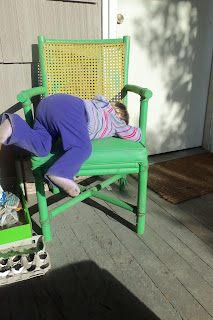April 16: Poetry Sparrows by Robert Cording
Does anyone else out there in the blog-o-sphere have really odd bathroom reading habits?!
I love to read in the bathroom, on the toilet, oh anytime I get a spare moment. And yes, in this house the bathroom is usually considered a spare moment. Most of our bathroom material is standard. Magazines: Sunset, The Atlantic (I cannot make it through and entire article in one sitting though), Bon Appetit, Food and Wine, Time. Gosh we get a lot of magazines! We are impressively well read for a young family.
WE also collect other things in our bathroom reading pile. Upstairs there is a book of Lenten reflections, a 2008 National Geographic, an article about Sexuality and St. Thomas Aquinas, and a book of poetry that has never made it to our bookshelf.
So yesterday, just before we left to take Maggie to the most exciting dog park in the universe (Marymore in Redmond, WA). I emptied my bladder and read this poem.
And I was thinking about it for hours afterwards: A sign of a good poem I think!
Sparrow: our generic for any of the small brown birds
we find everywhere. A farm field in early April,
nothing yet green. Or a sidewalk downtown
edged with February's dirty snow, a scrap
of paper with someone's name on it
skittering in gust of building-tunneled wind.
Sparrows: fussing about in the dirt, washing
themselves in a gutter's runoff, hanging on
the dry seed head of a a winter weed.
Barn, strip mall, field swamp, college ivy,
Walmart sign: all places prove their gift for
survival. Like the poor, they are their own keepers.
Once in Palestine there were so many, two
could be had for the price of one farthing,
but Jesus said his father knew each on of them,
just as the hairs on our head were numbered.
Those must have been house sparrows; they were
fruitful and multiplied because they fed on
the droppings of horses and cattle. Sparrows
I never learned them well enough. They slipped
in and out of my focus, the color of dust
and dirt, common-featured. Field sparrows,
fox sparrows, song sparrows, swamp sparrow.
It took so much attention to give a name
to them, the way, to often, I see the poor
only as that, their faces hidden as they lie
like sacks on grates of vented heat. Ubiquitous.
Common-featured. How can they be seen
when they are always in sight? When Jesus
laid his hands on the faces of the poor,
I'd like to believe he saw them as they wanted
to be seen: each a child who belonged
to somebody, who once had a given name.
From: Cording, Robert. Walking with Ruskin. (CavanKerry Press. Fort Lee, New Jersey, 2010) 32.
I love to read in the bathroom, on the toilet, oh anytime I get a spare moment. And yes, in this house the bathroom is usually considered a spare moment. Most of our bathroom material is standard. Magazines: Sunset, The Atlantic (I cannot make it through and entire article in one sitting though), Bon Appetit, Food and Wine, Time. Gosh we get a lot of magazines! We are impressively well read for a young family.
WE also collect other things in our bathroom reading pile. Upstairs there is a book of Lenten reflections, a 2008 National Geographic, an article about Sexuality and St. Thomas Aquinas, and a book of poetry that has never made it to our bookshelf.
So yesterday, just before we left to take Maggie to the most exciting dog park in the universe (Marymore in Redmond, WA). I emptied my bladder and read this poem.
And I was thinking about it for hours afterwards: A sign of a good poem I think!
Sparrows
A certain traveler who knew many continents
was asked what he found most remarkable
of all. He replied: the ubiquity of sparrows.
-Adam Zagajewski, Another Beauty
we find everywhere. A farm field in early April,
nothing yet green. Or a sidewalk downtown
edged with February's dirty snow, a scrap
of paper with someone's name on it
skittering in gust of building-tunneled wind.
Sparrows: fussing about in the dirt, washing
themselves in a gutter's runoff, hanging on
the dry seed head of a a winter weed.
Barn, strip mall, field swamp, college ivy,
Walmart sign: all places prove their gift for
survival. Like the poor, they are their own keepers.
Once in Palestine there were so many, two
could be had for the price of one farthing,
but Jesus said his father knew each on of them,
just as the hairs on our head were numbered.
Those must have been house sparrows; they were
fruitful and multiplied because they fed on
the droppings of horses and cattle. Sparrows
I never learned them well enough. They slipped
in and out of my focus, the color of dust
and dirt, common-featured. Field sparrows,
fox sparrows, song sparrows, swamp sparrow.
It took so much attention to give a name
to them, the way, to often, I see the poor
only as that, their faces hidden as they lie
like sacks on grates of vented heat. Ubiquitous.
Common-featured. How can they be seen
when they are always in sight? When Jesus
laid his hands on the faces of the poor,
I'd like to believe he saw them as they wanted
to be seen: each a child who belonged
to somebody, who once had a given name.
From: Cording, Robert. Walking with Ruskin. (CavanKerry Press. Fort Lee, New Jersey, 2010) 32.

Comments
Post a Comment